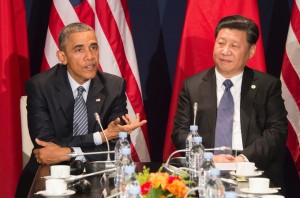Inside Climate News
by John H. Cushman Jr.
New study says that unless nations ramp up their carbon-reduction pledges before 2020, it will be nearly impossible to keep warming to 2 degrees.
The next three years provide the “last chance” to limit global warming to safe limits in this century, the United Nations said, as it geared up for a conference in Morocco intended to carry forward the Paris agreement on climate change.
Unless nations move before 2020 to cut their emissions more aggressively than they have promised, the window of opportunity will close and the job that lies ahead will become more costly, it said.
The annual “emissions gap” report compares the goals of the treaty to the pledges of its signatories. In it, the United Nations Environment Program (UNEP) warned that unless reductions in carbon pollution from the energy sector are reduced swiftly and steeply, it will be nearly impossible to keep warming below 2 degrees, let alone to the 1.5 degree aspiration.
Each year’s gap report, produced by expert scientists using the latest available data, makes clearer than ever that the treaty commitments undertaken so far fall short of what is needed to keep warming below the UN’s targets.
The 2016 assessment is especially significant for three reasons. It is being published just as the treaty enters into force, as countries are starting to plan their next steps. It is the first assessment to calculate the emissions that will occur under all the pledges made last year. And it is the first to hold those pledges up not only to the long standing 2-degree goal, but to the new 1.5-degree goal that was a central accomplishment of the Paris meeting last December.
Now that the treaty has been signed by enough countries to enter into force on November 4—much sooner than many had expected—delegates arriving in Marrakech for next week’s conference of parties are keen to keep the momentum building.
UNEP said that the need for urgent, immediate action to confront the climate crisis is “indisputable.”
Early action, it said, would help find the least expensive path toward eliminating carbon dioxide emissions in time to reach the 2-degree goal.
But speed is essential if there is any hope of keeping warming to 1.5 degrees, a target of vital concern to small island states and other poor nations that are most vulnerable to climate change.
“It is likely the last chance to keep the option of limiting global warming to 1.5 degrees C in 2100 open,” the report said, “as all available scenarios consistent with the 1.5 degree C goal imply that global greenhouse gases peak before 2020.”
Put that way, the gap facing treaty adherents is daunting, especially since emissions are currently rising at a steady clip.
“The rate of global greenhouse gas emissions increase during the period 2000 to 2010 was faster (2.2 percent per year) than during the period 1970 to 2000 (1.3 percent per year), increasing in 2010 and 2011 (3.5 percent per year) and then slowing in 2012 to 2013 (1.8 percent per year),” the report said.
“In summary, global greenhouse gas emissions continue to grow, and while the indications are encouraging that the growth rate of global carbon dioxide emissions from fossil fuel use and industry is slowing, it is still too early to say whether this is likely to be permanent.”
The Paris pledges “represent a first start to initiate the required transition, but are far from being consistent with the agreed upon long-term temperature goals.” If every country fulfilled its pledges the world would be on course to warm by about 3 degrees Celsius.
Under current pledges, the world would come close by 2030 to depleting the carbon budget for 2 degrees of warming, and would well exceed the budget for staying below 1.5 degrees.
PUBLISHED UNDER:
GLOBAL CLIMATE TREATY
PARIS CLIMATE TALKS MARRAKESH CLIMATE TALKS
EMAIL THIS PAGE
PRINTER-FRIENDLY VERSION
ABOUT THE AUTHOR

John H. Cushman Jr.
Jack Cushman is an editor and reporter for InsideClimate News. Before joining ICN, he worked for 35 years as a writer and editor in Washington, D.C., principally with the Washington bureau of The New York Times.
Cushman has written extensively about energy, the environment, industry and military affairs, also covering financial and transportation beats, and editing articles across the full spectrum of national and international policy. He served on the board of governors of the National Press Club and was its president in the year 2000.
He is the author of “Keystone and Beyond: Tar Sands and the National Interest in the Era of Climate Change.”







